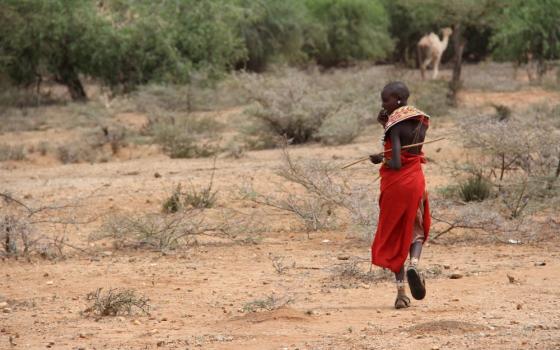Hopefully, you’ve been faithfully filling your Catholic Relief Services Rice Bowl for Lent – a program celebrating its 40th anniversary.
But if you’ve wondered exactly where that money goes, CRS has a great video about just one of their many programs the Rice Bowl helps fund.
The video focuses on the Cash for Work program CRS has in Niger. On the southern edge of the Sahara desert, the people who live there often find themselves going without while they wait for the next harvest. And in times of need, CRS – just like many other organizations – has often stepped in with food, tools or other relief.
But under Cash for Work, those in need are paid for working on community service work. That not only gives them cash to buy food, but the projects help everyone. In Niger, the video explains, the work is to improve the land so it can be farmed. A project to stop water run-off will prevent damage to crops and keep the village out of harm’s way.
Even better, the video points out, paying people for work empowers them to make their own decisions about how to meet their immediate needs until the harvest comes. And thanks to the projects completed under the program, future harvests may be better than ever.
New pastures for the sheep
In Kenya, meanwhile, it is the church’s assets that are being put to work.
Religion News Service reports that Kenya is facing increasing droughts due to climate change, leading to dying cattle and hungry people. To fight the problem, the Catholic church in Kenya is making 3,000 church-owned acres available for farming.
The story says the church owns massive tracts of land, most of it held by dioceses, parishes, missionaries and congregations – and most of it idle. This is the first time the church has begun large-scale farming:
‘We want to produce food, create employment and improve quality of life for the people,’ said the Rev. Celestino Bundi, Kenya’s national director of the Pontifical Mission Societies. . . . ‘We have the will and the support of the community and government. I think time has come for Kenya to feed herself.’
The church will create farms that will grow maize and beans, as well as raise chicken and dairy cattle, the story says, and work is set to begin immediately.
And the learning curve for the venture may not be as steep as one might expect: The 400-acre Limuru Archdiocesan Farm, owned by the Catholic Archdiocese of Nairobi, has been in operation since 2002.
In 2011, the farm started running a for-profit organization, producing vegetables, tea, milk and animal feed.
“We employ 200 people and the farm is able to pay them and sustain itself,” Martin Nderitu, the farm manager, told RNS. “The secret was to take a risk to expand and be persistent in production. We are making profits and expanding the farm.”
Pushing for policies
In Malawi, Catholic bishops are pushing for public policy changes to address devastation caused by climate change. Catholic News Agency reports that droughts and floods have increased in frequency and intensity in the last two decades, damaging food and water supplies and hurting an already struggling rural population:
Two weeks of heavy rain in January claimed more than 275 lives and displaced more than 230,000 persons from their homes. In addition to homes, infrastructure such as roads and bridges were damaged. Tens of thousands of farm animals, the primary form of capital for most farmers, have died or remain vulnerable to starvation and disease.
According to Voice of America, the flooding washed away more than 158,000 acres of farmland in the country where agriculture accounts for 30 percent of GDP.
So Malawi's bishops held a workshop for journalists to help them understand climate challenges and to mobilize public policy changes.
“Journalists drawn from various media houses in Malawi were sensitized on climate resilience policies, which includes a right-to-food bill, National Disaster Risk Management Policy, and national climate change,” Prince Henderson, communication officer of the Malawi bishops conference, told CNA.
CNA says the event was meant to equip journalists with knowledge on climate resilience policies so they can raise awareness among the public and stakeholders in an effort to help Malawi increase its food security and resilience against climate shocks.
Remember, links, tips and accounts of the response to any crisis anywhere in the world are always welcome at dstockman@ncronline.org.
[Dan Stockman is national correspondent for Global Sisters Report. Follow him on Twitter @DanStockman or on Facebook.]

